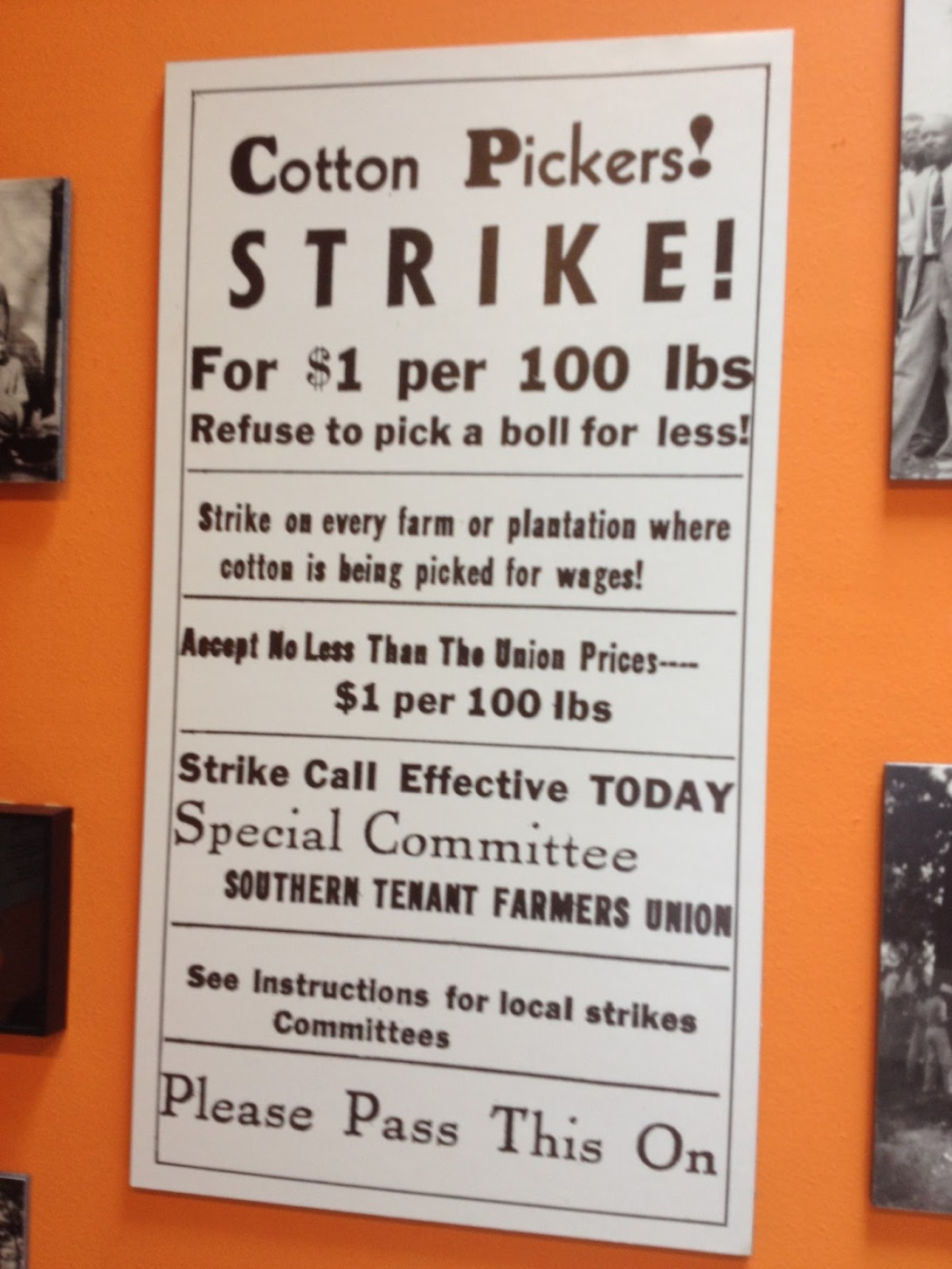VOICES: Labor needs an old-time revival in the South

A1930s strike banner on display at the Southern Tenant Farmers Museum in Tyronza, Arkansas. (Photo courtesy of Labor South.)
By Joe Atkins, Labor South
I've long preached about the need for labor and progressives in general who want to win over the South to tap into a Southern tradition that doesn't get much attention but which is every bit as real as those other, darker traditions that have held the region back much of its history. I'm talking about populism, real populism, not the faux kind pushed today by Fox News, but a rock-ribbed belief that blue-collar, small farmer, black and white and brown Southerners deserve their seat at the table and a voice in their lives.
You saw that tradition in Myrtle Lawrence, a white, uneducated, snuff-dipping sharecropper who became one of the Southern Tenant Farmers Union's best organizers in the 1930s. She was a major force in rallying the poorest of the South's poor to demand their rights as human beings, and to do it she had to withstand the condescending snickering of white Northern liberals and Southern black activists as well as the threats of landowners and right-wing politicians.
Today, most Democrats are too weak-kneed and compromised to reach out to modern-day Myrtle Lawrences who might help turn around the region that spawned the poisonous Tea Party movement that is pushing the Republican Party even further to the right.
"Democrats should demand that Tea Party rebels explain why they are in league with a party that intends to cut Medicare, Medicaid, and Social Security in order to finance more tax cuts for billionaires," William Greider writes in the latest edition of The Nation. "If common folks ever understand the corrupt nature of the Republican coalition, we will see a popular rebellion that makes the present chaos look like, well, a tea party."
The depth of that corruption can be seen in the current series running in the New York Times, "The 'Privatization' Of the Justice System," that details how corporations have sidetracked the nation's judicial system into corporate-friendly arbitration in handling consumer and employee lawsuits and complaints.
"All it took was adding simple arbitration clauses to contracts that most employees and consumers do not even read," reporters Jessica Silver Greenberg and Michael Corkery wrote. "Yet at stake are claims of medical malpractice, sexual harassment, hate crimes, discrimination, theft, fraud, elder abuse and wrongful death."
The Democratic Party's long record of cuddling up to labor during campaigns and generally ignoring it after the election shows that working people — whether in the South or beyond — cannot rely on mainstream political parties. A viable labor movement would do more than anything else to bring about real revolutionary change.
Labor organizer Tefere Gebre told Facing South's Chris Kromm recently that organizing the South is crucial to labor's future and to the region itself. "The South has become a dumping ground for the global multinationals. As Americans we feel offended that multinationals are seeking the South for cheap labor and unregulated labor and profiteering when they come and set up here."
Gebre talked about a new focus by organized labor on major Southern cities like Houston, Dallas, Atlanta, Orlando and Miami. All well and good, but more will be needed. The soul of the South has never been in its major cities. It's out in the country and in the small towns and medium-sized cities. Labor and other progressive groups have to reach the South's soul.
Myrtle Lawrence and the STFU did. Their meetings "had come to resemble a southern evangelical revival more than a labor organization," historian Elizabeth Anne Payne has written. "Women … gave testimony about the power of the STFU in Holiness style, witnessing that the Holy Spirit could instantly transform lives through the union."
A revival. That's what labor needs, and so does the South. Good preachers, too, and a gospel that champions regular working folks of all races and stands up to the dark, old, bankrupt traditions and ideas and their hypocrite apologists.
Tags
Joe Atkins
Joe Atkins is a professor of journalism at the University of Mississippi and author of "Covering for the Bosses: Labor and the Southern Press." A veteran journalist, Atkins previously worked as the congressional correspondent with Gannett New Service's Washington bureau and with newspapers in North Carolina and Mississippi.
